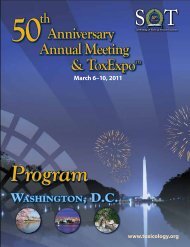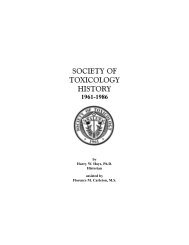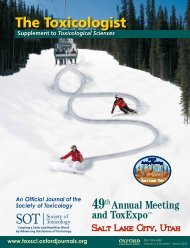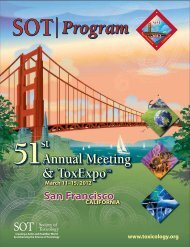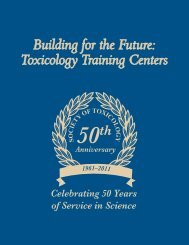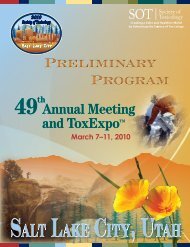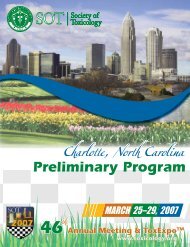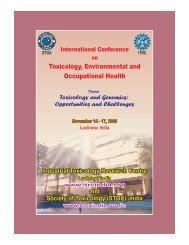51st Annual Meeting & ToxExpo - Society of Toxicology
51st Annual Meeting & ToxExpo - Society of Toxicology
51st Annual Meeting & ToxExpo - Society of Toxicology
You also want an ePaper? Increase the reach of your titles
YUMPU automatically turns print PDFs into web optimized ePapers that Google loves.
<strong>Society</strong> <strong>of</strong> <strong>Toxicology</strong> 2012<br />
Scientific<br />
Symposia<br />
• Cell Signaling in Response to PARP Inhibition and Alkylating<br />
Agent Exposure. Samuel Wilson, NIEHS, Research Triangle Park,<br />
NC.<br />
• Identifying Translational Components <strong>of</strong> the DNA Damage<br />
Response. Thomas Begley, State University <strong>of</strong> New York at Albany,<br />
Albany, NY.<br />
• Damage-Specific Pathways for the Regulation <strong>of</strong> Postreplication<br />
Repair. Karlene Cimprich, Stanford University, Stanford, CA.<br />
• Redundancy and Cross-Talk in Pathways and Functions in DNA<br />
Damage Responses to the Highly Toxic DNA Double-Strand<br />
Break. Richard S. Paules, NIEHS, Research Triangle Park, NC.<br />
Characterizing Toxic Modes <strong>of</strong> Action<br />
and Pathways to Toxicity<br />
The Thick and Thin <strong>of</strong> Nuclear Receptors and Nrf2<br />
in Diabetes and Obesity<br />
Monday, March 12, 9:15 AM to 12:00 Noon<br />
Chairperson(s): Angela Slitt, University <strong>of</strong> Rhode Island, Kingston,<br />
RI, and Lauren Aleksunes, Rutgers University, Piscataway, NJ.<br />
Sponsor:<br />
Molecular Biology Specialty Section<br />
Endorsed by:<br />
Cardiovascular <strong>Toxicology</strong> Specialty Section<br />
Mechanisms Specialty Section<br />
Molecular Biology Specialty Section<br />
The Thematic Track information can be found on pages 8–9.<br />
Xenobiotic nuclear receptors, such as CAR, PXR, AHR, FXR, and<br />
NRF2 are best known for transcription regulation and induction <strong>of</strong><br />
Phase I and Phase II biotransformation enzymes, as well as transporters.<br />
These receptor pathways are <strong>of</strong> interest because they are<br />
activated by diverse chemicals—drugs, chemicals <strong>of</strong> environmental<br />
exposure, as well as endogenous chemicals such as hormones and<br />
bile acids. It is well established that there are chemical-receptor<br />
interactions—especially in the liver, which lead to transcriptional<br />
upregulation <strong>of</strong> gene batteries and result in coordinate regulation<br />
<strong>of</strong> metabolism and transport. However, recent evidence points to<br />
nuclear receptors and the role for these receptors in diseases related<br />
to metabolic syndrome, dyslipidemia, and glucose homeostasis. As<br />
the incidence <strong>of</strong> obesity and obesity-related diseases, which culminate<br />
in metabolic syndrome, increase worldwide, understanding<br />
the mechanisms <strong>of</strong> obesity is <strong>of</strong> high interest for human health. As<br />
these receptors are targeted by drugs and environmental chemicals,<br />
it is <strong>of</strong> importance to understand how activators <strong>of</strong> these xenobiotic<br />
receptors affect aspects <strong>of</strong> adipocyte differentiation, adiposity, and<br />
pancreatic function in adults, as well as sensitive populations, specifically<br />
pregnant women and children. Our findings will be presented<br />
for various receptor-mediated pathways with regard to various obesity<br />
and diabetes models. Presentations will cover nuclear receptor-mediated<br />
gene induction and research findings related to nuclear receptors<br />
with regard to obesity and diabetes. Finally, findings will be presented<br />
regarding what is currently known regarding nuclear receptor function<br />
in caloric restriction, the practice most recommended to combat<br />
obesity and obesity-related disorders. The information presented will<br />
be useful to those interested in nuclear receptors, aspects <strong>of</strong> metabolic<br />
syndrome, mouse models <strong>of</strong> obesity and diabetes, aspects <strong>of</strong> metabolic<br />
syndrome and drug interactions, therapeutic drug targets, and<br />
environment-obesogen effects.<br />
• A Novel Function <strong>of</strong> the Xenobiotic Receptor CAR in Obesity<br />
and Type-2 Diabetes. Wen Xie, University <strong>of</strong> Pittsburgh School <strong>of</strong><br />
Pharmacy, Pittsburgh, PA.<br />
• Paradoxical Roles <strong>of</strong> Nrf2 Activation in Arsenic-Induced<br />
Pancreatic β-Cell Dysfunction and Insulin Resistance. Jingbo Pi,<br />
The Hamner Institute, Research Triangle Park, NC.<br />
• Bile Acid and Nuclear Receptor Signaling in Diabetes and<br />
Obesity. John Chiang, Northeastern Ohio Universities, Rootstown,<br />
OH.<br />
• Hepatobiliary Transporter Regulation in Diabetic Pregnancy:<br />
Influence <strong>of</strong> Nrf2 and FXR-Shp Signaling. Lauren Aleksunes,<br />
Rutgers University, Ernest Mario School <strong>of</strong> Pharmacy, Piscataway,<br />
NJ.<br />
• Reversing Obesity and Metabolic Syndrome: Do Nuclear<br />
Receptors Have a Role in Weight Loss? Angela Slitt, University <strong>of</strong><br />
Rhode Island, Kingston, RI.<br />
Aberrant Gene Expression in Toxicity<br />
and Disease—Epigenetics and<br />
microRNAs<br />
Toxicological Considerations <strong>of</strong> Epigenetic<br />
Targets in Product Development<br />
Monday, March 12, 9:15 AM to 12:00 Noon<br />
Chairperson(s): Melissa Rhodes, GlaxoSmithKline, Research Triangle<br />
Park, NC, and Brandon Jeffy, Celgene, San Diego, CA.<br />
Sponsor:<br />
Drug Discovery <strong>Toxicology</strong> Specialty Section<br />
Endorsed by:<br />
Carcinogenesis Specialty Section<br />
Mechanisms Specialty Section<br />
Molecular Biology Specialty Section<br />
Regulatory and Safety Evaluation Specialty Section<br />
Reproductive and Developmental <strong>Toxicology</strong> Specialty Section<br />
In recent years, epigenetic factors have been implicated in the etiology<br />
<strong>of</strong> various diseases including cancers, psychiatric disorders, and<br />
diabetes/obesity. As epigenetic mechanisms have become more extensively<br />
characterized, new opportunities for therapeutic intervention<br />
Thematic Session<br />
70<br />
SOT’s 51 st <strong>Annual</strong> <strong>Meeting</strong>



